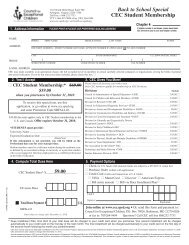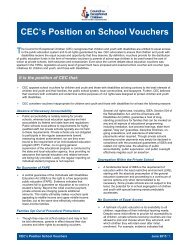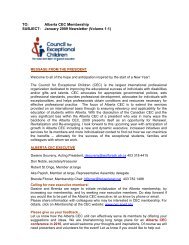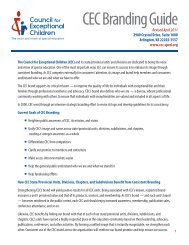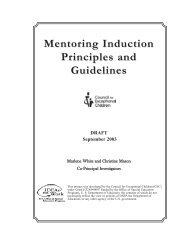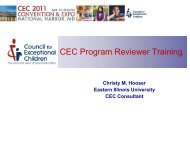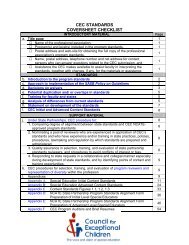What Every Must Know Special Educator - Council for Exceptional ...
What Every Must Know Special Educator - Council for Exceptional ...
What Every Must Know Special Educator - Council for Exceptional ...
Create successful ePaper yourself
Turn your PDF publications into a flip-book with our unique Google optimized e-Paper software.
(1) Conceptual Framework. Programs have a<br />
conceptual framework that establishes the<br />
programs vision and its relationship to the<br />
programs components and curricula.<br />
(2) Candidate Content, Pedagogical, And<br />
Professional <strong>Know</strong>ledge, Skills, And<br />
Dispositions<br />
i. Content Standards. Programs ensure that<br />
prospective special educators have mastered<br />
the CEC <strong>Special</strong> Education Content Standards<br />
<strong>for</strong> their respective roles.<br />
ii. Liberal Education. Programs ensure that<br />
prospective special educators have a solid<br />
grounding in the liberal curricula ensuring<br />
proficiency in reading, written and oral<br />
communications, calculating, problem solving,<br />
and thinking.<br />
iii. General Curriculum.<br />
(a) Programs ensure that prospective special<br />
educators possess a solid base of understanding<br />
of the general content area curricula 1 i.e., math,<br />
reading, English/language arts, science, social<br />
studies, and the arts, sufficient to collaborate<br />
with general educators in:<br />
Teaching or collaborative teaching academic<br />
subject matter content of the general curriculum<br />
to students with exceptional learning needs<br />
across a wide range of per<strong>for</strong>mance levels.<br />
Designing appropriate learning and<br />
per<strong>for</strong>mance accommodations and<br />
modifications <strong>for</strong> students with exceptional<br />
learning needs in academic subject matter<br />
content of the general curriculum.<br />
(b) Programs preparing special educators <strong>for</strong><br />
secondary level practice and licensure in which<br />
the teachers may assume sole responsibility<br />
<strong>for</strong> teaching academic subject matter classes,<br />
ensure that the prospective special educators<br />
have a subject matter content knowledge base<br />
sufficient to assure that their students can<br />
meet state curriculum standards.<br />
(3) Assessment System and Program Evaluation.<br />
Programs have an assessment system to<br />
collect and analyze data on the applicant<br />
qualifications, candidates and graduate<br />
per<strong>for</strong>mance, and program operations<br />
sufficient to evaluate and improve the<br />
program.<br />
(4) Field Experiences and Clinical Practice.<br />
Programs with their school partners have<br />
designed, implemented, and evaluated field<br />
experiences and clinical practica sufficient<br />
<strong>for</strong> prospective special educators to develop<br />
and apply knowledge, skills, and dispositions<br />
essential to the roles <strong>for</strong> which they are being<br />
prepared.<br />
(5) Diversity. Program with their school partners<br />
have designed, implemented, and evaluated<br />
curriculum and experiences sufficient <strong>for</strong><br />
prospective special educators to develop and<br />
apply their knowledge, skills, and dispositions<br />
necessary to help all students learn. The<br />
curricula and experiences include working<br />
with diverse faculty, candidates, and P-12<br />
exceptional students.<br />
(6) Faculty Qualification, Per<strong>for</strong>mance, and<br />
Development. The program faculty is qualified<br />
and model best professional practice in their<br />
scholarship, service, and teaching.<br />
(7) Program Governance and Resources.<br />
The program has appropriate leadership,<br />
authority, budget, facilities, and resources to<br />
address professional, institutional, and state<br />
standards.<br />
Paragraph 5: Standards <strong>for</strong> Entry<br />
Into Professional Practice<br />
a. Requirements <strong>for</strong> professional practice should<br />
be sufficiently flexible to provide <strong>for</strong> the newly<br />
emerging and changing roles of special education<br />
professionals and to encourage experimentation<br />
and innovation in their preparation.<br />
b. CEC and its divisions should be the lead<br />
organizations in establishing minimum standards<br />
<strong>for</strong> entry into the profession of special education.<br />
CEC should develop and promote a model that<br />
requires no less than a bachelor’s degree which<br />
encompasses the knowledge and skills consistent<br />
with entry level into special education teaching.<br />
c. Each new professional in special education should<br />
1 As used the phrase, “academic subject matter content of the general curriculum”, means the content of the general curriculum including<br />
math, reading, English/language arts, science, social studies, and the arts. It does not per se include the additional specialized knowledge and<br />
skill that special educators must possess in areas such as reading, writing, and math.<br />
Appendix 9: CeC profeSSionAl poliCieS 281



